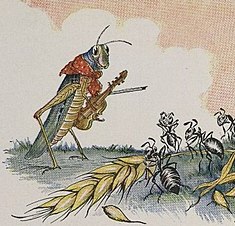 Even though throughout Candide there are new characters in every chapter (making it hard to keep up with all of them and their experiences), they all come together for what I would say is the only actual happy part of the story (no sarcasm in it). I feel corny but I'll just spill the beans: The story's ending was comforting and happy.
Even though throughout Candide there are new characters in every chapter (making it hard to keep up with all of them and their experiences), they all come together for what I would say is the only actual happy part of the story (no sarcasm in it). I feel corny but I'll just spill the beans: The story's ending was comforting and happy. I have to accept the story was not easy to understand, but the end has a nice morale, the world is full difficulties and people should work and toil to survive it. A maxim like this isn't forgotten, it appears even today children's fables like in The Ant and the Grasshopper. In this fragment of Aesop´s Fables the lazy grasshopper doesn't work during spring and then freezes and is hungry in winter, while the ant stores provisions for the winter, so he has enough food and shelter to endure this part of the year. In this case, the ant represents all the characters who have learned they have to work and how this will pay off. The satirical novel ends by clearly stating that you ought to work for what you want and most importantly, take nothing for granted.
